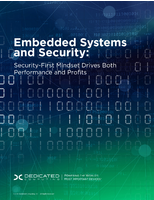IPC criticizes bad science in Greenpeace electronics guide.
Share:
Press Release Summary:
IPC is criticizing the bad science in latest revision of "Guide to Greener Electronics," which rates consumer electronics companies against Greenpeace criteria on hazardous substances, take back and recycling, energy use, and climate change. According to IPC, Greenpeace is penalizing companies for failing to phase out and openly support restrictions on BFRs. Science does not support need to phase out all BFRs and, in fact, shows that TBBPA is safe for humans and the environment.
Original Press Release:
IPC Criticizes Bad Science, Methodology in Greenpeace Electronics Guide
BANNOCKBURN, Ill., USA, - IPC - Association Connecting Electronics Industries® is criticizing the "bad science" in the latest revision to Greenpeace's electronics scorecard, "Guide to Greener Electronics." The guide rates consumer electronics companies against Greenpeace criteria on hazardous substances, take back and recycling, and energy use and climate change. IPC has made the following statement on the Guide:
"Greenpeace continues to mark down leading consumer electronics manufacturers for failing to lobby for an agenda based on faulty science. Several computer manufacturers received lower scores for not aggressively removing brominated flame retardants (BFRs) from their products.
"The science does not support the need to phase out all BFRs. In fact, the World Health Organization and the European Commission's Scientific Committee on Health and Environmental Risks conducted separate, comprehensive scientific assessments of Tetrabromobisphenol-A (TBBPA), a widely used BFR, and both found TBBPA to be safe for human health and the environment.
"In addition, IPC, on behalf of our members, is extremely concerned about Greenpeace's tactics in penalizing companies for 'failing to openly support restrictions on ... brominated flame retardants (BFRs)....' In fact, Greenpeace provides specific wording it would like to see companies use in calling for an expansion of the RoHS Directive to include the ban of BFRs.
"Demonizing certain substances without a scientific basis can lead industries to adopt substances that have a greater environmental impact or that cause resources to be inefficiently used. IPC calls on nongovernmental organizations (NGOs) and regulators to adopt scientific principles in the evaluation and banning of any chemicals and substances."
Facts on the Greenpeace ranking criteria are available at www.ipc.org/ehs/greenpeace. They include:
Ranking Criteria: Substituting harmful chemicals in the production of electronics will prevent worker exposure to these substances and contamination of communities that neighbor production facilities.
Fact: The World Health Organization and the European Commission's Scientific Committee on Health and Environmental Risks (SCHER) conducted separate, comprehensive scientific assessments of TBBPA and both found TBBPA to be safe for human health and the environment.
Fact: In Europe, the flame retardant industry's Voluntary Emissions Control Action Programme (VECAP) has reduced manufacturing-related releases of TBBPA to air and water to less than one kilogram total in 2009.
Ranking Criteria: Eliminating harmful substances will also prevent leaching/offgassing of chemicals like brominated flame retardants (BFR) during use, and enable electronic scrap to be safely recycled.
Fact: TBBPA is chemically bound into the plastic matrix of the printed board and therefore is not chemically available (for leaching or offgassing) during use.
Fact: Metals are reclaimed from waste printed boards through incineration. Regulated, controlled incineration of bromine- and chlorine-containing materials does not pose a problem for human health or the environment.
Ranking Criteria: The presence of toxic substances in electronics perpetuates the toxic cycle - during reprocessing of electronic waste and by using contaminated secondary materials to make new products.
Fact: The World Health Organization and the European Commission Scientific Committee on Health and Environmental Risks (SCHER) conducted separate, comprehensive scientific assessments of TBBPA and both found TBBPA to be safe for human health and the environment.
Fact: Current best management of end-of-life circuit boards is energy and metals recovery through controlled incineration. Regulated, controlled incineration of bromine- and chlorine-containing materials does not pose a problem for human health or the environment.
Ranking Criteria: The issue of toxicity is overarching. Until the use of toxic substances is eliminated, it is impossible to secure "safe" recycling.
Fact: Regulated, controlled incineration of bromine- and chlorine-containing materials does not pose a problem for human health or the environment.
About IPC
IPC (www.IPC.org) is a global trade association based in Bannockburn, Ill., dedicated to the competitive excellence and financial success of its 2,700 member companies which represent all facets of the electronics industry, including design, printed board manufacturing, electronics assembly and test. As a member-driven organization and leading source for industry standards, training, market research and public policy advocacy, IPC supports programs to meet the needs of an estimated $1.7 trillion global electronics industry. IPC maintains additional offices in Taos, N.M.; Arlington, Va.; Garden Grove, Calif.; Stockholm, Sweden; Moscow, Russia; Bangalore, India; and Shanghai, Shenzhen and Beijing, China.



